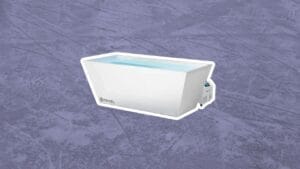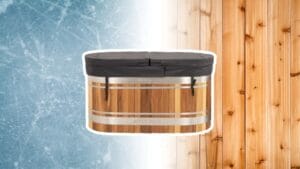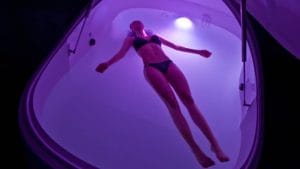What is the best time to take a cold plunge? Should you do it after a workout, first thing in the morning, or right before bed? These are the questions we’re about to answer.
Timing can make all the difference when it comes to cold plunging, whether you’re aiming for faster recovery or just looking to add something refreshing to your routine.
Let’s break down the best times to cold plunge, how often you should do it, and what you need to keep in mind.
When is the Best Time to Take a Cold Plunge?
The best time to take a cold plunge largely depends on what you’re trying to achieve. Here’s a detailed look at when cold plunging might bring you the most benefits:
- After a Workout: One of the most common times people cold plunge is after a workout. This is because cold exposure can reduce muscle soreness, inflammation, and speed up recovery. Whether you’ve just finished a gym session, a long run, or intense cardio, jumping into cold water helps your muscles heal faster and reduces stiffness. Athletes swear by this for its ability to keep them performing at their best, but you don’t have to be an athlete to benefit. Even for moderate exercise, cold plunging post-workout can refresh tired muscles and prevent excessive soreness the next day.
- As a Morning Ritual: If you’re someone who likes to start the day with an energy boost, cold plunging in the morning is a great way to do it. A quick dip in cold water wakes up your system, improves circulation, and gives you a natural rush of adrenaline, which can be more effective than that morning coffee. It’s an invigorating way to get your day started on the right foot and can help you feel more alert, focused, and ready to tackle whatever comes your way.
- At Night Before Bed: Surprisingly, cold plunging at night has its benefits too. While it may seem like cold exposure would wake you up, it actually helps some people relax before sleep. By calming your nervous system and lowering your core temperature, a cold plunge before bed can help signal your body that it’s time to wind down, making it easier to fall asleep and stay asleep. So, if you struggle with nighttime restlessness, this could be a helpful addition to your evening routine.
- After a Sauna Session: Another highly effective time for a cold plunge is after spending time in a sauna. The contrast between the heat of the sauna and the shock of the cold water creates a revitalizing experience for your body. It improves circulation and stimulates detoxification, leaving you feeling refreshed and re-energized. Many people love the feeling of the extreme temperature change, as it not only feels great but also promotes overall wellness. This hot-to-cold transition is a key part of traditional sauna practices.
These four moments—after a workout, as a morning ritual, at night before bed, and after a sauna—are prime times to incorporate cold plunging into your routine. Each timing has its own unique benefits, depending on what your body needs at that moment.
Also read: Cold Plunging Best Practices
How Often Should You Cold Plunge?
For beginners, it’s usually best to start slow, about two to three times a week. This allows your body to gradually adapt to the cold without feeling too overwhelmed. It’s important to ease into it and not rush, as too much cold exposure right away can be counterproductive, causing more stress on your body than necessary.
Once you’ve gotten used to the cold, you can increase the frequency. Regular cold plungers or athletes may benefit from cold plunging four to six times a week, depending on their recovery needs. At this stage, your body becomes more resilient to the cold, and you’ll likely notice faster recovery times, better energy, and improved mental clarity.
Building up tolerance is key, so listen to your body. If you’re feeling fatigued or experiencing any negative effects, like prolonged shivering or discomfort, it’s a sign that you might be overdoing it. Pay attention to how your body reacts and adjust the frequency as needed.
Does Time of Day Affect the Benefits of Cold Plunging?
Yes, the time of day can affect the benefits you get from cold plunging. The effects you experience may vary depending on whether you take a plunge in the morning or at night. Cold plunging in the morning can boost your energy and improve focus, making it a perfect addition to your morning routine. It wakes up your system, stimulates circulation, and gets your metabolism going for the day ahead.
In contrast, cold plunging at night can help you wind down. It might sound surprising, but a quick dip in cold water before bed can help reduce your core temperature and calm your nervous system. For some, this makes it easier to relax and fall asleep more quickly.
Your body’s natural circadian rhythms also play a role. For instance, in the morning, your body temperature is lower, so a cold plunge may feel more intense but also more energizing. At night, your body temperature naturally drops as part of preparing for sleep, and the cold plunge could enhance that effect.
Can You Cold Plunge Every Day?
Yes, daily cold plunging is possible and often recommended for athletes, but it’s important to pay attention to how your body responds. Some people enjoy cold plunging every day for its consistent benefits, like increased energy and faster recovery. However, your body needs time to adapt, and for those just starting out, plunging every day might be too much.
The key is balance. While cold exposure has its perks, overdoing it can lead to issues like excessive shivering, feeling fatigued, or general discomfort. These signs tell you that your body might need a break. If you’re pushing too hard, it’s better to take a step back and reduce the frequency.
A good starting point is to cold plunge every other day or three to four times a week. As your tolerance grows, you can consider plunging more often, even daily, if it feels right for your body. Just remember, it’s all about finding what works for you, not about forcing it every day.
When Should You Avoid Cold Plunging?
There are specific times when it’s best to avoid cold plunging, particularly if you have certain health conditions or circumstances that might make it risky. Here are some situations when you should hold off:
- If you have heart conditions or high blood pressure: Cold exposure puts stress on your cardiovascular system. If you have heart problems or circulation issues, consult a doctor before cold plunging.
- When you’re sick or recovering from illness: Cold plunging while fighting off an illness, such as a cold or flu, can slow your recovery. Your body is already under stress, and the cold may hinder healing.
- After a large meal: Wait at least an hour or two before cold plunging after eating. The cold water can divert blood from your digestive system, causing discomfort or slowing digestion.
- If you feel too cold or uncomfortable during the plunge: Listen to your body. If you’re shivering excessively, feeling unwell, or uncomfortable during the plunge, it’s okay to stop early or skip a session entirely.
- If you have a condition affecting circulation or cold sensitivity: Some conditions, like Raynaud’s syndrome, make you more sensitive to cold. In these cases, it’s best to avoid cold plunging or seek medical advice.
Conclusion
The best time to take a cold plunge really depends on your goals and what fits into your routine.
Whether it’s after a workout to help with recovery, in the morning to get that energy boost, before bed to unwind, or after a sauna for that refreshing contrast, there’s no shortage of benefits depending on when you do it. What matters most is consistency and listening to your body. You don’t need to cold plunge every day, but finding a routine that suits you is key.
Stick to best practices—start slow, keep track of how long you stay in, and pay attention to how your body responds. There are also times when it’s better to avoid cold plunging altogether, like when you’re feeling unwell or dealing with certain health conditions. The important thing is to make it work for you and get the benefits that suit your lifestyle.







